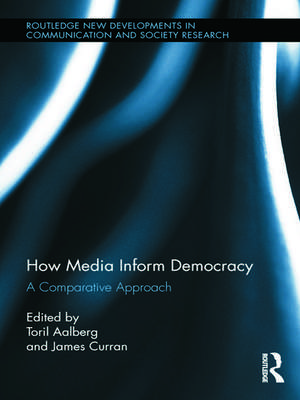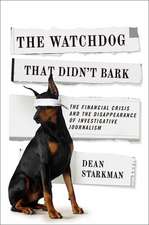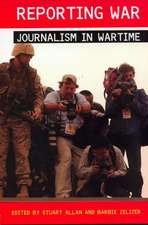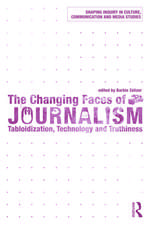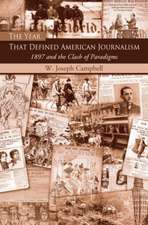How Media Inform Democracy: A Comparative Approach: Routledge New Developments in Communication and Society Research
Editat de Toril Aalberg, James Curranen Limba Engleză Paperback – 8 noi 2013
- Can a comparative approach provide us with new answers to the question of how media inform democracy?
- Has increased commercialization made media systems more similar and affected equally the character of news and public knowledge throughout the USA and Europe?
- Is soft news and misinformation predominantly related to an American exceptionalism, based on the market domination of its media and marginalized public broadcaster?
| Toate formatele și edițiile | Preț | Express |
|---|---|---|
| Paperback (1) | 436.74 lei 6-8 săpt. | |
| Taylor & Francis – 8 noi 2013 | 436.74 lei 6-8 săpt. | |
| Hardback (1) | 1105.24 lei 6-8 săpt. | |
| Taylor & Francis – 23 sep 2011 | 1105.24 lei 6-8 săpt. |
Preț: 436.74 lei
Nou
Puncte Express: 655
Preț estimativ în valută:
83.57€ • 87.26$ • 69.01£
83.57€ • 87.26$ • 69.01£
Carte tipărită la comandă
Livrare economică 15-29 aprilie
Preluare comenzi: 021 569.72.76
Specificații
ISBN-13: 9780415740425
ISBN-10: 0415740428
Pagini: 244
Ilustrații: 49 black & white tables, 8 black & white halftones
Dimensiuni: 152 x 229 x 18 mm
Greutate: 0.32 kg
Ediția:1
Editura: Taylor & Francis
Colecția Routledge
Seria Routledge New Developments in Communication and Society Research
Locul publicării:Oxford, United Kingdom
ISBN-10: 0415740428
Pagini: 244
Ilustrații: 49 black & white tables, 8 black & white halftones
Dimensiuni: 152 x 229 x 18 mm
Greutate: 0.32 kg
Ediția:1
Editura: Taylor & Francis
Colecția Routledge
Seria Routledge New Developments in Communication and Society Research
Locul publicării:Oxford, United Kingdom
Public țintă
Postgraduate and UndergraduateCuprins
I: Introduction 1: How Media Inform Democracy: Central Debates, Toril Aalberg and James Curran 2: Research Design, Toril Aalberg, Zan Strabac and Tove Brekken II: How Media Provides Political Information 3: Media Systems and the Political Information Environment. A Cross-National Comparisons, Toril Aalberg, Peter van Aelst and James Curran 4: The Political Information Environment during Election Campaigns, Peter van Aelst, Kjersti Thorbjørnsrud and Toril Aalberg 5: News Substance: The Relative Importance of Soft and De-contextualized News, Tove Brekken, Kjersti Thorbjørnsrud and Toril Aalberg III: How Media Affects Public Knowledge And Perceptions 6: News Content, Media Use and Current Affairs Knowledge, James Curran, Sharon Coen, Toril Aalberg and Shanto Iyengar 7: Media, Political Trust and Political Knowledge: A Comparative Perspective, Kees Aarts, Audun Fladmoe and Jesper Strömbäck 8: Does Knowledge of Hard News go with Knowledge of Soft News? A Cross-National Analysis of the Structure of Public Affairs Knowledge, Kyu S. Hahn, Shanto Iyengar, Peter van Aelst and James Curran 9: Informed Citizens, Media Use and Public Knowledge of Parties Policy Positions, Anders Todal Jenssen, Toril Aalberg and Kees Aarts 10: The Financial Crises as a Global News Event: Cross-National Media Coverage and Public Knowledge of Economic Affairs, Jesper Strömbäck, Anders Todal Jenssen and Toril Aalberg 11: News Consumption and Public Opposition to Immigration across Countries, Zan Strabac, Kjersti Thorbjørnsrud and Anders Todal Jenssen 12: Conclusion, Toril Aalberg and James Curran
Recenzii
'The book is rich with interesting findings...a vital addition to both scholars and society.' – MichaelKarlsson, Global Media Journal
Descriere
In this timely book, leading researchers consider how media inform democracy in six countries – the United States, the United Kingdom, Belgium, the Netherlands, Norway, and Sweden. Taking as their starting point the idea that citizens need to be briefed adequately with a full and intelligent coverage of public affairs so that they can make responsible, informed choices rather than act out of ignorance and misinformation, contributors use a comparative approach to examine the way in which the shifting media landscape is affecting and informing the democratic process across the globe. In particular, they ask:
- Can a comparative approach provide us with new answers to the question of how media inform democracy?
- Has increased commercialization made media systems more similar and affected equally the character of news and public knowledge throughout the USA and Europe?
- Is soft news and misinformation predominantly related to an American exceptionalism, based on the market domination of its media and marginalized public broadcaster?
